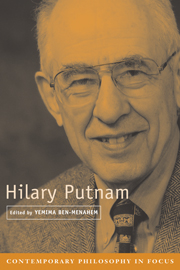Book contents
- Frontmatter
- Contents
- List of Contributors
- Acknowledgments
- 1 Introduction
- 2 Putnam's “The Meaning of ‘Meaning’”: Externalism in Historical Context
- 3 The Face of Perception
- 4 Realism, Beyond Miracles
- 5 Putnam on Skepticism
- 6 The Tale of Quantum Logic
- 7 Another Philosopher Looks at Quantum Mechanics, or What Quantum Theory Is Not
- 8 Structural Realism and Contextual Individuality
- 9 The Rise and Fall of Computational Functionalism
- 10 The Pragmatic Turn: The Entanglement of Fact and Value
- Index
- References
2 - Putnam's “The Meaning of ‘Meaning’”: Externalism in Historical Context
Published online by Cambridge University Press: 08 January 2010
- Frontmatter
- Contents
- List of Contributors
- Acknowledgments
- 1 Introduction
- 2 Putnam's “The Meaning of ‘Meaning’”: Externalism in Historical Context
- 3 The Face of Perception
- 4 Realism, Beyond Miracles
- 5 Putnam on Skepticism
- 6 The Tale of Quantum Logic
- 7 Another Philosopher Looks at Quantum Mechanics, or What Quantum Theory Is Not
- 8 Structural Realism and Contextual Individuality
- 9 The Rise and Fall of Computational Functionalism
- 10 The Pragmatic Turn: The Entanglement of Fact and Value
- Index
- References
Summary
INTRODUCTION
In what sense did Putnam invent the doctrine of semantic externalism? His causal treatment of reference, developed in the mid-1960s and most famously defended in “The Meaning of ‘Meaning’” (1975; hereafter MoM) was, inter alia, a response to the then popular idea that when our beliefs change (as when science progresses), so do the meanings and referents of our terms. Because of the influence of Carnap, Kuhn, and Malcolm, this relativist conception seemed viable at the time, and Putnam's response, accordingly, revolutionary. But surely, one might protest, the founding fathers of early analytic philosophy, Frege and Russell, were not tempted by any such relativism. What prevented them from adopting the relativist line of thinking that associated with different theories or criteria different meanings, different referents, even different worlds? Were they already semantic externalists? If not, why not?
These questions are anachronistic, but instructively so. They allow us to investigate in what ways Putnam's externalism constitutes a critique of Frege – as Putnam quite explicitly said that it did – and in what ways it constitutes an extension or interpretation of Frege. Similar questions may be asked about Russell and about various stages in his development, for Russell's conception(s) of analysis and doctrine(s) of immediate acquaintance appear on the surface to have lodged logical form (hence, objectivity and meaning) in the mind's immediate contact with extra-mental entities. But in what follows I shall largely focus, as does Putnam, on Frege.
- Type
- Chapter
- Information
- Hilary Putnam , pp. 17 - 52Publisher: Cambridge University PressPrint publication year: 2005
References
- 4
- Cited by

